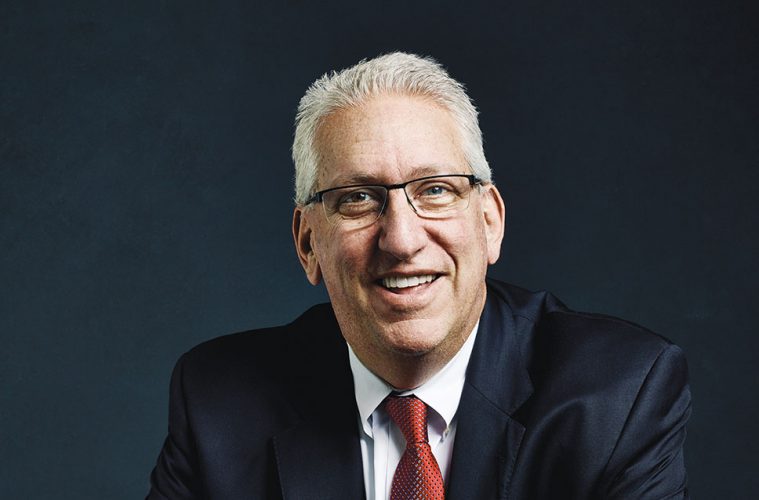Hospital care can be a complex high-tech maneuver or a remarkably simple act. As president and CEO of Anna Jaques Hospital, a nonprofit community hospital in Newburyport, Mark Goldstein has seen the full spectrum.
When Goldstein witnessed a nurse pulling a computer on wheels into a patient’s room, he noticed her frustration as the equipment bumped against the door’s threshold. Goldstein checked in with her and heard the nurse’s concern firsthand. “The very next day,” Goldstein says, “we sent maintenance there and removed all the thresholds. It was a simple, no-cost solution.”
Another time, as he was making rounds in the ICU, Goldstein asked the nursing staff how the hospital could help. Right away, they requested warm blankets for the patients. “For a few thousand dollars, we were able to get a blanket warmer,” Goldstein recalls.
Both solutions arose after Goldstein instituted a regular rounding team when he became the hospital’s CEO in 2015, with all of Goldstein’s seven vice presidents doing regular rounds in teams of two. Besides listening to staff, the senior team members cover topics to improve the hospital experience, called “rounding to influence.” One month it was the importance of checklists, and another time the topic was eye wash stations—always, as Goldstein says, “bringing a safety story to the floors.”
“We listen to staff,” Goldstein says. “They don’t get everything they want, but they get an answer and we get some quick, easy wins. While we’re doing that, we’re building confidence in the staff. And it’s fun.”
Goldstein exudes a visceral pleasure working in healthcare. “I love community medicine,” he says. It shows. Anna Jaques, the largest employer in the community, has around 1,200 employees (and 250 volunteers), and Goldstein knows most of their names.
In the last several years, Anna Jaques has found its place in the sun. In 2010, the hospital became clinically aligned with Beth Israel Deaconess Medical Center; four years later, the Anna Jaques Cancer Center opened, with doctors from Beth Israel and Anna Jaques forming teams to treat patients. Thanks to a successful $6.5 million capital campaign in 2012, the hospital now offers primarily private rooms at no extra cost to the patient or insurance company. The campaign also financed the new Zampell power plant, which saves energy and reduces the hospital’s carbon footprint.
The hospital has recently won a raft of awards, including three citations by the Boston Business Journal as one of the “Best Places to Work” and inclusion in “150 Great Places to Work in Healthcare” in 2015 by Becker’s Healthcare Review—as one of only four Massachusetts hospitals recognized. The workplace awards are very meaningful to Goldstein. “If the employees are happy and like their work environment, the patients see that,” he says.
Goldstein started at Anna Jaques as CFO and served in that position for five years, charged with improving the hospital’s financial picture at a time when healthcare was roiling with change. He then was named executive vice president, while remaining CFO for another four years. “Delivering healthcare is so complicated today,” he says. “It’s a hard system to navigate.” But the hospital is clearly working. “We’ve been profitable for 11 years running,” Goldstein says.
Financial viability in healthcare is one of the most important concerns of hospital CEOs, and Goldstein has held steady at the helm of Anna Jaques and its annual $130 million budget. The impressive financials—the hospital has one of the lowest cost structures for state hospitals—led to a request by Governor Charlie Baker last October for Goldstein to sit on the state’s Price Variation Commission to study the problem of varying reimbursements from commercial insurance companies. Reimbursements are critically important in healthcare. “There are three major challenges—what we get paid by insurance companies, high technology, and attracting the highest talent,” Goldstein says. “I think that’s the blueprint for an organization.”
Hand in hand with profitability at Anna Jaques is impressive growth, including an expansion in Haverhill, where the hospital is constructing a 30,000-square-foot, state-of-the-art medical office building. Expected to open in fall 2017, the new facility will house primary care, women’s healthcare, pediatrics, laboratory services, and other physician specialty groups. “Our goal is to keep more care local by offering residents of Haverhill and surrounding towns another attractive option for care, right in their own community,” Goldstein says.
Goldstein originally set his sights on accounting. In college, he got an internship at Worcester Memorial Hospital, which, as he says, “put a little experience on my resume.” After working for Blue Cross Blue Shield in the audit division, he became senior director of finance at Newton-Wellesley Hospital, where he worked under Ron Bartlett, who mentored Goldstein as he honed his financial acumen and motivated him to get his MBA at Boston University. Goldstein also worked for Bartlett for 10 years at Boston Medical Center.
Elaine Ullian, CEO of Boston Medical Center during Goldstein’s tenure there, was also a big influence. “I watched how Elaine listened to people, regardless of what their job was,” Goldstein says. “I saw her create Boston Medical Center’s campus and programs.” When he became CFO at Anna Jaques, Goldstein says, he had “no aspiration to be a CEO.” But then-CEO Delia O’Connor had other ideas. “After five years at Anna Jaques, she really wanted me to expand,” Goldstein says.
Goldstein and his wife, Susan, have made Newburyport their home. More than just the hospital drew Goldstein to Newburyport. Another mentor, David LaFlamme—board chair of Anna Jaques—taught Goldstein much about community. “He’s shown me the importance of volunteering and knowing your community,” Goldstein says.
Community—and Anna Jaques’ strong stature in it—accounts for much of Goldstein’s satisfaction. “We’re positioned for success. We were created in 1884, and we’ll be around for a long, long time.”

